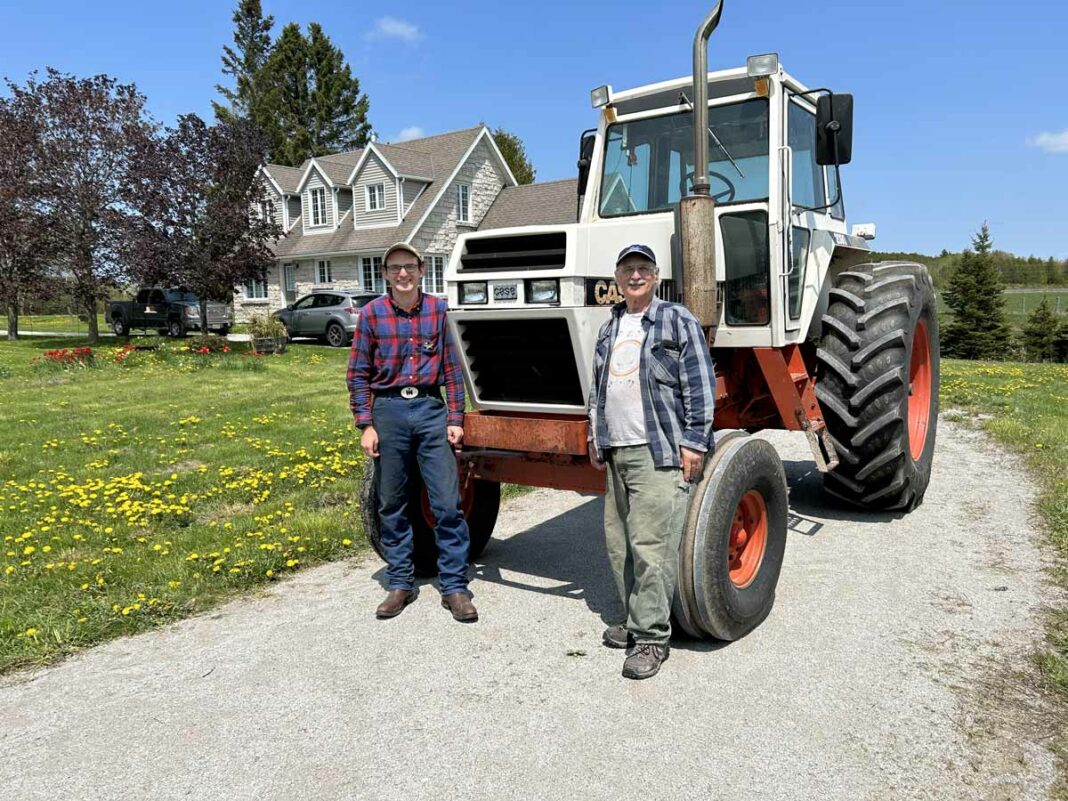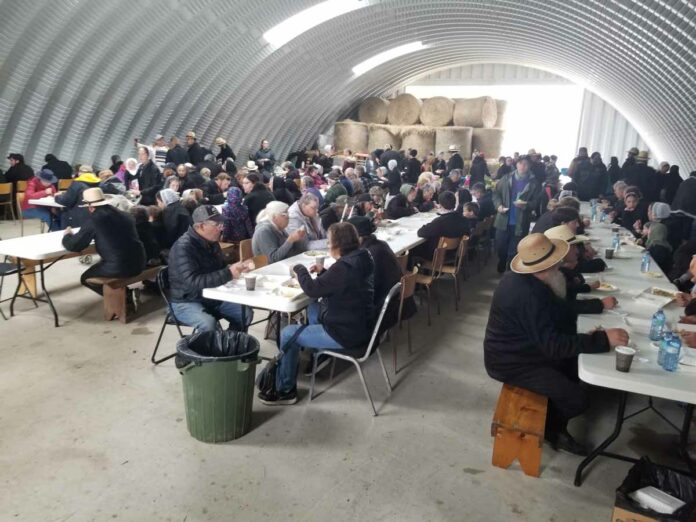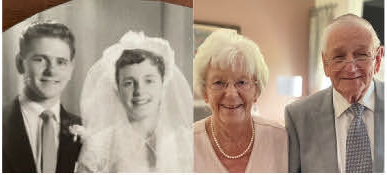Still doing its job: family finds ideal Island farm through an Expositor ad
EDITOR’S NOTE: The Renecker family’s move to their new farm on Smeltzer’s Road in Tehkummah is an excellent choice for this year’s Expositor volume change story. Not only do the Reneckers personify the increasing demand for Manitoulin farmland but it also gives perspective to the benefits of a well-read community newspaper. Lyle Renecker ran a standard display ad in the November 2, 2022 edition outlining what he was looking for and a Providence Bay reader (now a friend) saw the ad and contacted Mr. Renecker to bring the Tehkummah property to his attention. The rest is history.
TEHKUMMAH—At almost the exact same time that William Loe Smith launched The Manitoulin Expositor in 1879 (144 years ago today, as it happens, on May 24, 1879), the first generation of Renecker farmers was establishing roots in the Stratford area. Lyle Renecker’s great-grandparents had emigrated from Hanover, Germany the previous year and purchased land for their farm, which would go on to be home to four generations of livestock and cash crop farmers.
The most recent cohort was Lyle and his wife Teresa. Lyle had enjoyed a classic rural childhood, attending a one-room schoolhouse, participating in 4-H, playing the fiddle and fastball, and fishing and hiking in nature whenever he could. “I likely would still be milking cows had quota not come in,” he laughs. “That changed everything, and I was suddenly unsure what to do.”
After considering veterinary college and dentistry, Lyle eventually studied biology, graduating with a three-year undergraduate science degree from Wilfred Laurier University. His goal was to land a job with the Ministry of Natural Resources (MNR), a plan that was foiled when he discovered that MNR would only hire people with four-year degrees.
That prompted him to pursue a master’s degree, which he began at Laurentian University in part because he had family living in the region. His thesis focused on the impacts of winter severity on Manitoulin white-tailed deer, which necessitated field work on the Island. He spent several winters in the mid-1970s studying deer populations from three observation sites in Michael’s Bay, Burnt Island and Srigley Bay, all of which left a lasting and positive impression on him. He recalls that The Expositor took an interest in his findings about the Island population and published his entire thesis.
While working on his master’s, he spent a semester at the University of Alberta where he encountered his professor and mentor in animal science, Dr. Bob Hudson, who specialized in wildlife productivity. When Lyle graduated with his second degree, he again applied to MNR for employment only to find he was now overqualified.
Recognizing the need to change career direction, he decided to do a PhD and, thanks to support from his mentor, received research funding to conduct moose bioenergetics and nutrition studies at the University of Alberta. Following graduation, this led him to do post-doctoral work in Alberta and then to the University of Alaska, Fairbanks where he secured a research/teaching position, a post he held for five years. While there, his research focused on reindeer herding and game management which entailed the animal productivity and management in conjunction meat quality, composition and marketing of commercial game species.
That move changed everything. While engaged in this research, Lyle got funding to pay for a master’s degree student to do field work that resulted in him meeting Teresa Tomany. A native of Alaska, she had graduated from Iowa State University with an undergrad degree in animal science – the perfect candidate for Lyle’s new project.
“I was born and raised in the Alaskan bush and had been surrounded by wildlife all my life,” explains Teresa. “This project gave me a chance to put my interest in animal science to work as we focused on meat quality science, research that supported the export of reindeer meat processed at a commercial meat plant in Anchorage.”
What began as a supervisory relationship evolved over time into a romance and marriage. Lyle and Teresa married in 1994 while still working in Alaska but they left their polar life behind soon after to return to the Renecker family farm in Ontario. By that time, Lyle’s aging parents could no longer keep the operation going so Lyle returned to farming, although he switched from dairy cattle to elk ranching. The couple raised, slaughtered and marketed elk meat for domestic and international restaurant consumption and harvested the antlers for the Korean retail market until 2015. Theresa was able to complete her master’s degree through Laurentian University, once moving east, and went into teaching.
Lyle’s interest in wild game continued as he dabbled in projects supporting Indigenous communities interested in capitalizing on marketing wild game. He does frequent contract work in Canada’s Far North, working with the Inuvialuit in the NWT, and as far away as Namibia and Nigeria in Africa, helping communities to maximize their meat processing facilities and value-added products based on country foods and wild meats for both food security and economic development.
In the meantime, his son Johannes has taken a keen interest in maintaining the Renecker family tradition of farming. He’s had farming in his blood since childhood, showing dairy cattle in his local 4-H club for a decade before following in his father’s footsteps and pursuing an agricultural degree at the University of Alberta. His initial interest was in livestock, but he transferred from animal science to crop science in his third year.
Johannes might have become the fifth generation to work the land at the family homestead had urbanization not encroached on their property to the point that it was becoming more and more difficult to carry on, let alone enjoy, agricultural life. “We were being jammed in by new housing developments and traffic was becoming intolerable, making it nearly impossible to move farm equipment on what used to be quiet country roads.”
Johannes’ interest in cash crop farming posed a problem for the Reneckers if they were they to expand their farming operation in southwestern Ontario. As more and more rural land was snapped up for housing, land prices soared, making it prohibitively expensive to purchase more acreage. That led the family to start looking afar, stirring Lyle to consider Manitoulin where he had spent time as a graduate student and had fond memories of the region. Having relatives living nearby in the Sudbury area was a bonus when searching for a place to buy property.
Lyle placed an ad in The Expositor last fall seeking potential farms to purchase and searched online for a property with farm buildings and a yard, since they didn’t want to build from scratch. With the help of local real estate agent, Leanne Lewis, they settled on a beautiful farm in Tehkummah that ticks all the boxes.

Manitoulin Expositor seeking a farm to buy.
Lyle and Teresa purchased the farm to get Johannes established in an area that offers not only a place to make a good living but also one that offers a strong sense of community, which is of great importance to them all. “We wanted a place where we know Johannes will be knee-deep in community and we already feel we’ve found that having met so many great people. We’ve been welcomed with open arms by our neighbours and the local church congregation,” says Theresa. “It’s like life used to be years ago when Lyle was a child in southern Ontario.”
“It’s so refreshing and rejuvenating to be up here again,” adds Lyle. “It’s the first time in a long time I’ve been somewhere without urban traffic and white noise. We can hear the creek in the backyard instead of the constant roar of urban life in the background.”
Johannes still has one more year to complete his degree and will return to Alberta to finish his studies in the autumn. Before then, he’ll be busy planting his first crop of soybeans on the family’s new farmland as well as the additional acreage they’re renting locally. His plan is to do test plots and research trials on different crops and seed companies as well as provide some custom farm services.
Over the longer term, eventually farming 600 to 1,000 acres, he wants to plant canola, corn, wheat, soybeans, pulse crops, clover and buckwheat. He intends to integrate classic agricultural techniques with precision ag technologies such as GPS, auto steer and Geo mapping to determine which areas of the field are deficient in certain nutrients to reduce fertilizer inputs while increasing productivity.
The family’s still in the early days of unpacking, settling Johannes’ three 4-H cows and Teresa’s horse into their new home while making plans to build a grain silo. Teresa can’t make the final move until the end of the school year, as she teaches high school in southern Ontario, something she hopes to do on Manitoulin too so she can share her love of math and science. Given the great start they’ve got off to, she is feeling positive and looking forward to exploring their new Island life.
“I’ve had a lot of people warning me that it is quite isolated up here, but I tell them that where I grew up where there was only one airplane a month bringing supplies, so I am sure I’ll do fine,” she chuckles. “The Manitoulin is one of the first places Lyle ever brought me when we first moved to Ontario decades ago and I feel the universe is finding its equilibrium. Johannes has so many ideas and dreams and there’s just so much potential here.”
Likewise, Lyle could not be more positive about the future given the warm reception his family has received since arriving. “We have made about eight trips on the Chi-cheemaun to bring up farm equipment. Everyone knows us to the point they waited to close the ferry one trip because they knew we were coming with large equipment and running late. All that was said is ‘that’s OK, don’t bother stopping, just go right up and drive on as we were waiting for you.’ Now where on the planet could this happen but Manitoulin?!”





